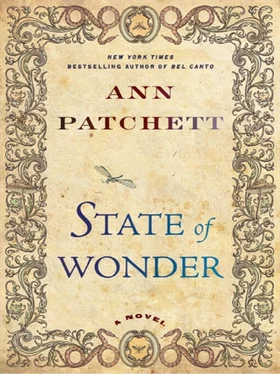Their hosts followed the conversation intently, their faces turning from speaker to speaker as if they were watching a tennis match. “What is your field of study, Dr. Nkomo?”
“Please,” he said, “call me Thomas. I suppose you would say I focus on the drug’s off-target toxicity, except in this case it isn’t toxic. The drug has exhibited benefits unrelated to fertility.”
There were questions to ask, namely what the benefits were and who was paying for his research, but at that moment Easter appeared over the top of the ladder, every bit as wet as he had been coming up out of the river and over the side of the boat. Marina understood the look of panic on his face. He was sure she was dead as she had been sure he was dead. His eyes went quickly around the room, passing over her and stopping only briefly on Thomas Nkomo. He started to go down the ladder again but she stood up quickly and when he realized it was her in that dress with her hair braided he bounded up the last few rungs of the ladder, his T-shirt stretched out by the rain, the mud making a solid cake up to his knees. He began slapping his open hands against her arms, her hips, her back. He could not stop himself. She was his responsibility and he had lost her.
The Lakashi nodded and clucked their tongues and pointed at him but Easter would not look in their direction and so they gave up. There was no teasing the deaf if they refused to look at you.
“The rain is letting up,” Thomas said, craning his head to look beyond the edges of the roof. “Or maybe it’s stopped now and the trees are just dripping. It’s very difficult for me to tell the difference between the current rain and the continued falling of the rain we’ve already had.”
“I don’t mind getting wet again.” Marina put her arm around Easter’s shoulders. She was thinking about his box, the pens and feathers, Anders’ open letter to the world on his behalf.
“Then we should go.” Thomas began a series of deep nods around the room.
“How do you say thank you?”
“To the best of my knowledge the word doesn’t exist in Lakashi. I’ve asked other people that question and no one comes up with anything.”
Marina looked at her hosts, who stared expectantly as if they were hoping she would figure it out. “What about in Portuguese?”
“Obrigado.”
“Obrigado,” Marina said to the pregnant woman but there was no change in expression. She put her hand on the woman’s belly again but the baby was quiet.
Easter tugged at the cloth of Marina’s dress, then he held out his shirt, pointed at his shirt, and then pointed at her. Marina looked around the room. There were a few hammocks strung between poles, some piles of blankets and clothes on the floor, some baskets with roots and some baskets with twigs, but she did not see her shirt and pants. In truth, if he hadn’t mentioned her clothes she probably would have gone right down the ladder without them, she was so distracted by what she had seen. She shook her head. Easter then went to the pregnant woman and held out his shirt to her between two fingers and pointed to Marina. The woman seemed to have no idea what he was getting at. Marina did a pantomime of unbuttoning her shirt, taking her fingers down the front of her dress where the buttons would have been, but again the woman shrugged.
Thomas then said a word, basa or basi , which was probably the word he believed meant clothes, but it was met with the same blank expression as the Portuguese word for thanks. He held out his own shirt and pointed to Marina. The younger woman took her place on the floor and resumed the twisting and knotting of palm fronds as if there had never been visitors at all and then, in what was the most damning gesture of false innocence, the teenage girl sat down to help her. The baby was settled on the floor and given a palm frond to play with and he put the tip of it in his mouth and sucked contentedly.
“I believe you’ve been scammed,” Thomas said.
“Out of my clothes?” Marina couldn’t quite imagine such a thing was possible even as she stood there in a smock. Easter crossed the room and started digging through a pile on the floor and one of the men came over and smacked him on the side of the head with the flat of his hand.
“This isn’t good,” Marina said. “I don’t know where my luggage is.”
“The bag you came with from Manaus?” Thomas said. “Wasn’t it on the boat with you?”
She turned to him. Suddenly the dress felt very small. “Of course it was on the boat with me but, my God, coming into all that fire and screaming, all these men climbing on board from the water, and then the next thing I knew Dr. Swenson was going up the dock. I wasn’t going to stay there and find my luggage.”
“Of course,” Thomas said. He did not offer her a single word of encouragement. He did not tell her as anyone would that this was a very small village and surely there was no place for her bag to go. The teenage girl was up now, slapping at Easter’s hands, and then the littlest girl, the toddler, came over and she hit him as well. “We should go now, Dr. Singh,” Thomas said.
“Please,” she said, surprisingly heartbroken over such a small loss. “Call me Marina.”
Marina had been in the jungle for a week before Dr. Alan Saturn, whom she thought of as the first Dr. Saturn, said he would borrow Easter and the boat and make a trip to the trading post two hours away to mail some letters. (The trading post was not a trading post at all but a larger village down river where the more advanced Jinta Indians had their camp. They were, for a small price, willing to hold letters and money until a trader passed through from Manaus, which they did with some frequency. For a larger price, the traders would then take the letters back with them to mail — no small request as the mail was going to Java and Dakar and Michigan and they themselves were not men born with a natural inclination to stand in long post office lines.) Once the trip was established, everyone save Dr. Swenson broke from work to sit down for some time after lunch to commit themselves to paper. Dr. Budi gave Marina three blue tissue Aerograms from her considerable stack and Alan Saturn said he would stand her for the stamps. Marina, whose luggage had yet to be recovered, had spent the past seven days in her Lakashi dress, though she had been given an identical spare out of either guilt or compassion by an anonymous tribe member. Nancy Saturn, the second Dr. Saturn, had given her two extra pairs of underwear and Thomas Nkomo had a toothbrush still in the plastic wrap. He put it in her hand very discreetly. It seemed to Marina that these were among the kindest gifts of her existence.
“This is why I don’t loan out the boat,” Dr. Swenson said, looking around the lab as the doctors scattered with paper and pens, those charming dinosaurs of communication. “Once you say it’s leaving no one seems to think there’s any work to do.”
But work was all there was to do. Marina had been set up in the corner of the lab and been given the job of running tests on the compound for stability, to see whether it was degrading with heat and exposure. Like Anders, she was a small molecule person. Their work had been in pills and while it wasn’t an exact match for the task at hand it was comfortably within her realm of experience. There was enough data piled up to keep her busy for years and she wondered if that wasn’t Dr. Swenson’s objective — to keep her busy. It was possible that they were feeding her problems they had already solved as a means of placating her or testing her competence. They had mice after all, they were clearly already onto testing the concentration of the compound in blood levels. Still, she knew that if she stayed in her corner looking over what they had given her she would be much more able to make a realistic assessment of how far they were from a first efficacious dose. She could sidle over to Dr. Budi from time to time — Budi was in charge of clinical research organization — and ask her questions about the Lakashi blood work. She could see now how ridiculous it had been to simply ask Dr. Swenson over dinner what her progress was. Working here she had the chance to make her own assessment, and that was what Mr. Fox had wanted all along.
Читать дальше












